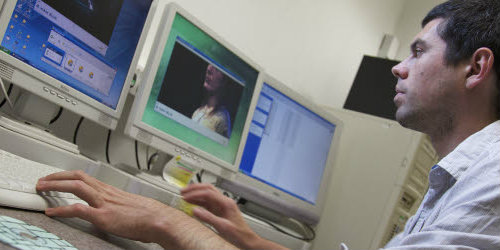The epic reach of elliptic curves
Pioneering research carried out by one of the UK’s leading teams of cryptographers is steering radical changes in global online security.
A staggering amount of data is transmitted across the world every day via the burgeoning amount of networked devices. At the last estimate, the quantity of data stood at over 1.5m gigabytes per minute.
Safety in numbers
According to Intel, by 2017 it is estimated that the number of connected devices will reach three times the number of people on Earth. It isn’t hard to see why protecting that data is of vital importance, whether it is the property of banks, individuals, commercial organisations, governments or any other sector of our increasingly global society.
The security of that data relies more and more on Elliptic Curve Cryptography (ECC), a fast-paced discipline that combines mathematics with computer science and electronic engineering to produce some of the most sophisticated technologies underpinning the online activity of some two billion users worldwide. Elliptic curves reduce large numbers into smaller components, thereby increasing the speed and efficiency of computing processes, which can consequently deal with ever increasing quantities of data.
Bristol’s Cryptography and Information Security Group, established by Professor Nigel Smart in 2000, is one of the UK’s leading research groups operating in the field. Thanks to the myriad of connections that Professor Smart and his team have made across the academic and industrial sector, their findings are being embedded within a growing number of digital platforms, from mobile phones to games consoles to the vast array of systems commercialised by the likes of Sony, Microsoft and Trend Micro.
Industry and academia in unison
“If you really want science to influence people you have to go and talk to them,” says Professor Smart, who is also the Vice President of the International Association for Cryptologic Research.
“Really good technology research in universities is indistinguishable from good technology research in corporations. They may be oriented differently in terms of the altruistic academic motivation versus the monetary outcomes pursued by industry, but essentially the relationship between the two sectors and their ambitions are perfectly symbiotic.”
Professor Smart’s group has directly influenced the development of emerging platforms such as the Europay-Mastercard-Visa (EMVCo) chip and pin technology. Over 1.5bn of cards are already in use worldwide, with the technology due to be rolled out even further in the next five years.
One of the most high profile standards governing those technologies, the IEEE 1363.3 (Institute of Electrical and Electronics Engineers), was also written with input from Bristol, while the group’s work on ECC systems was pivotal in creating systems used in Research in Motion Blackberries, accounting for approximately 100 million units worldwide.
The science of speed
“You need technologically complicated components in order to propel new business opportunities,” adds Professor Smart. “A company like Amazon, for instance, works with fundamentally technologically complicated systems that govern operational product delivery practices through the science of operational research. The same applies to Google and Facebook; neither were the first nor the only companies of their kind, the reason they succeeded where others failed is because they invest in proper research that underpins everything they do.”

